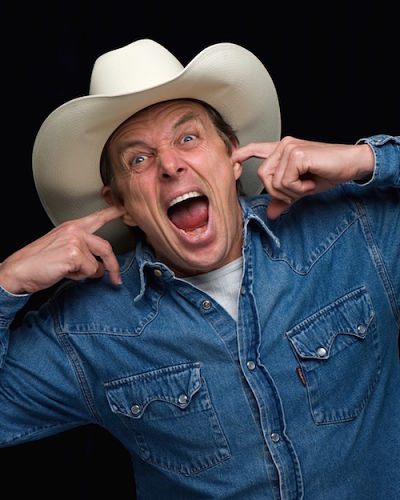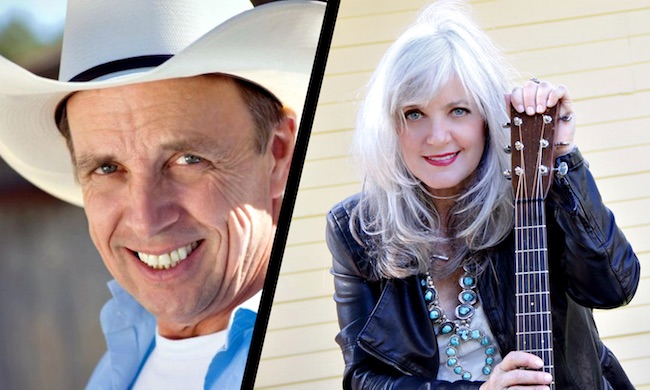Review: Is There Life after Lubbock? by Jaston Williams
by Brian Paul Scipione
Dust in their Blood: An Intimate Night with Jaston Williams and Kimmie Rhodes
Jaston Williams the actor, writer, producer and notable wit, got together with country singer and songwriting star Kimmie Rhodes at the Stateside Theatre at the Paramount in Austin to answer a seemingly simple question: Why Lubbock? Using songs, personal stories, poetry and many, many jokes they hashed out the possible reasons why a quiet and dusty outpost in the Texas panhandle had produced so many incredible talents. Williams opens the show by answering a query of his own, “Why am I the way I am?” with three simple words: “I blame Lubbock.” Of course the reason Lubbock gets this distinct blame (or more accurately praise) cannot be answered so succinctly.
 Jaston Williams is well known as the creator of the award-winning series of plays about a fictional small Texas town called Tuna. The first play, Greater Tuna, may have humbly debuted in Austin in 1981 but during the following decades the series of plays expanded to off-Broadway, San Francisco, Edinburgh, and many other locations around the globe and culminated in three different command performances at the White House in Washington D.C. It is fair to say that Williams knows how to translate the idiosyncrasies of small town America into award-winning comedic gold. Fans of the Tuna series know that William’s singular greatest talent is the extensive range of characters he can inhabit at any given moment, male or female. So it is fitting that his first attempts at elucidating the Lubbock riddle are by telling tales of some of the more outrageous personages of his past: Cled the poodle groomer, Jane the motherly grad student with the razor-scarred voice (the story of her husband’s pet ocelot is a scream), and T. J. ‘Tiny’ McFarland. Tin's funeral caused Jaston to enjoin the crowd with the entreaty "We should enjoy our grief.” Even the sad memories are tinged with happiness.
Jaston Williams is well known as the creator of the award-winning series of plays about a fictional small Texas town called Tuna. The first play, Greater Tuna, may have humbly debuted in Austin in 1981 but during the following decades the series of plays expanded to off-Broadway, San Francisco, Edinburgh, and many other locations around the globe and culminated in three different command performances at the White House in Washington D.C. It is fair to say that Williams knows how to translate the idiosyncrasies of small town America into award-winning comedic gold. Fans of the Tuna series know that William’s singular greatest talent is the extensive range of characters he can inhabit at any given moment, male or female. So it is fitting that his first attempts at elucidating the Lubbock riddle are by telling tales of some of the more outrageous personages of his past: Cled the poodle groomer, Jane the motherly grad student with the razor-scarred voice (the story of her husband’s pet ocelot is a scream), and T. J. ‘Tiny’ McFarland. Tin's funeral caused Jaston to enjoin the crowd with the entreaty "We should enjoy our grief.” Even the sad memories are tinged with happiness.
But what is it that made this cast of characters survive, flourish, and eventually outgrow their rugged origins? Williams offers a little more evidence when he opines, “Out there you have to serve as your own best critic: your own taskmaster.” Your neighbors and parents are perhaps more concerned with eking out a living in that rough landscape while escaping occasional tornados. Williams hilariously details the vital importance his mother put on shelter etiquette. “Where you went during a tornado became a social event. Mother had a list. . . . ” Despite the approaching funnel of wind-raging doom creeping their way, she would insist they did not simply run to the nearest neighbor’s storm cellar lest they insult another neighbor by not visiting their cellar instead. The audience howls with glee as Williams imitates his father pleading for his mother to “just get in the damn car!” but she refuses until he agrees to go to the more proper social call -- that is, not the closest place of safety. It is no wonder that Williams quickly learned the importance of setting one’s one artistic standards. It was as if the locals cared more about what you did rather than how or why you did it.
Yet, there is more to the story than that: growing up in (and getting out of) Lubbock had a hushed but stirring compulsion due to the bleak, often-threatening, natural environment. You learned how to supplement your lack of avocados by making guacamole with green peas. And then there’s the ever present coating of dust. “What they all have in common,” Williams explains about the nascent celebrities of Lubbock, “is the dust in their blood.”
Kimmie Rhodes adds many fine anecdotes of her own before and after regaling the audience with her sweet and soul-full songs. She recounts a story of how she was so broke that they she had sent out letters to all her debtors asking for more time with a small payment towards the sizable balances she owed at the time. Suddenly, her luck turns when she sells one of her songs to Wynonna Judd. The royalty check she receives has so many zeros she is sure it must be a mistake. Yet after cashing it successfully she has enough money to pay off all her debts; there is a just little money left. “So I bought a vacuum cleaner and I called it Wynonna.”
After listening to Kimmie sing, accompanied on lead guitar by her son, Gabriel, Jaston Williams comments with a wry smile, “it takes quite an artist to make that West Texas wind beautiful.” And here in a small way, we have our answer to the show’s query. Lubbock’s severe austerity creates resilient but mirthful characters. The discreet but ever sizzling electricity of latent natural disaster and the stark expanse of gorgeous but nearly barren land makes it a land of contradictions and majesty. It may engender poets, but in the end, Williams reminds us, “You have to go away to have the career.”
The night ends with the modern day fable-like tale of one of Lubbock’s most famous sons, Buddy Holly. On February 3, 1959, Holly, Ritchie Valens, and J. P. "The Big Bopper" Richardson died in a plane crash. Waylon Jennings, Tommy Allsup, and Carl Bunch were all on the same tour of the Midwest but for various reasons they did not get on the plane. Kimmie Rhodes, whose career was intertwined with that of Waylon Jennings, tells the story. There was no agreement on who should ride the bus to the next gig and who should get on the plane. Reportedly, Holly laughingly said to Jennings ‘I hope you get in a car wreck’ to which Jennings replied similarly, ‘I hope you get in a plane crash.’ This fateful exchange is the saddest story told all night. The ironic authenticity is immediately brought to life when Rhodes ends the night by singing one of Holly’s more intimate songs: “The sun is out, the sky is blue. There’s not a cloud to spoil the view but it’s raining, raining in my heart.”
Is There Life after Lubbock?
by Jaston Williams
Jaston Williams
March 24, 2016
Is There Life After Lubbock? plays one intimate performances Stateside at the Paramount March 24th only; at 8pm. Tickets on sale now at AustinTheatre.org, by calling (512) 474-1221 or in person at the Paramount Theatre Box Office.
